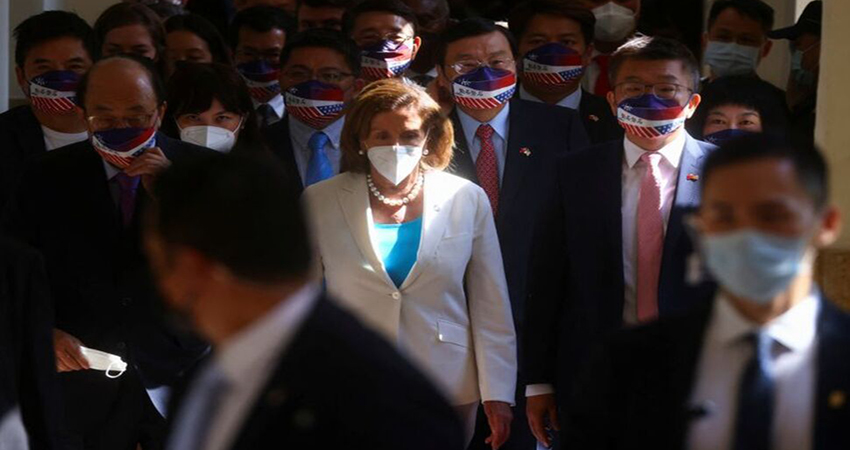Nancy Pelosi has flown back home after her Asia visit, but the ramifications of her tour continue to ignite new fires in the region. One is quite mystified why the Speaker of the US House of Representatives needed to make a trip to Taiwan and reassure President Tsai Ing-wen of her support for Taipei’s democracy.
Visits of this nature are undertaken by United States presidents, vice presidents and secretaries of state. House speakers traditionally handle internal American politics, like the inquiry into the January 6, 2021 insurrection by Trump loyalists. They stay away from making forays into foreign policy.
Pelosi’s trip now has the Chinese government up in arms. Besides, experts in diplomacy have been critical of the visit, for the very good reason that it has inflamed passions in Asia and around the globe.
One understands that President Biden was not in favour of Pelosi’s visit to Taipei, but now that she has gone ahead with it, the entire fabric of US-China ties has been put under immense strain. The Speaker should have heeded warnings from Beijing that her visit would not be welcome.
What precisely was the message Nancy Pelosi, third in line to the American presidency, trying to convey in Taipei? That with the Russians having marched into Ukraine, fears that China could attempt a similar exercise over Taiwan called for Taiwan’s leaders to be reassured about Washington’s continuing support for the independence of a country which is no more than a breakaway province of China?
Pelosi’s trip brings into question the entire gamut of Beijing-Washington links as initiated by President Richard Nixon in February 1972 and carried forward by his successors in the White House.
The Nixon odyssey to Beijing, where the President’s interaction with Chairman Mao Zedong and Premier Zhou En-lai laid the foundations of a new relationship between China and the United States, has now been fractured by Pelosi’s ill-advised visit to Taipei.
It has placed Washington in an embarrassing position, given that the governments of the US and China will yet need to conduct normal diplomacy, insofar as it is now possible, without seeing conditions revert to the 1950s, when John Foster Dulles actively promoted through SEATO and CENTO a ‘contain China’ policy. It was a stance that held good through the 1960s under the Kennedy and Johnson administrations.
The Pelosi trip has now provoked the Chinese into hardening their position on Taiwan, a sign of it being the military drills Beijing has been carrying out around the island. It would be unwise to suppose that President Xi Jinping will let the Pelosi incident pass without any action.
Beijing’s cancellation of a meeting between the foreign ministers of China and Japan on the sidelines of the ASEAN meeting in Phnom Penh, coupled with the angry denunciation of the Pelosi trip to Taipei by Foreign Minister Wang Yi, ought not to be taken lightly.
China’s growing clout not only in Asia but around the world has been misjudged by the West. But misjudgment again is what Nancy Pelosi has gone for.
The Pelosi visit will have consequences, not all of them unintended. China’s condemnation of the G-7 over the group’s criticism of Beijing’s policies is a powerful sign of its not taking things lying down.
The country’s ambassador in London has just served a warning on British parliamentarians who might be tempted to follow in Pelosi’s footsteps with their own visit to Taipei that they ought to desist from undertaking such a journey.
President Xi has thus clearly been given the upper hand by Pelosi and one could now look to a hardening of the Chinese position vis-à-vis the South China Sea.
History is always a study in inevitabilities. When the British handed over Hong Kong to China in 1997 --- and Beijing has been asserting itself strongly in its affairs of late --- it was history which came into play. Hong Kong had always been Chinese and holding on to it by London would have been pointless.
Macau was transferred back to China in 1999. In 1971, the People’s Republic of China gained the right to enter the United Nations, forcing Chiang Kai-shek’s Republic of China, as the defeated generalissimo called Taiwan after his forces fled to the island in the aftermath of the Communist victory of 1949, out of the global body.
The facts are obvious. Taiwan is a breakaway province of China, despite calling itself the Republic of China. On a global scale, there is One China, the implication being that Taiwan, or Formosa, is part of it. For Beijing, the judicious task will be to negotiate a peaceful return of the island to the motherland.
Pelosi’s provocative visit to Taipei now raises the spectre of a military invasion of the island, an image the world would be sorry to see. With Russian President Putin having taken control of Crimea and now laying Ukraine waste, a precedent has already been set. President Xi would be wise not to go down that road.
And western politicians, despite pretending that times and perspectives have not really changed, that they still have the upper hand in world affairs, would do well to not wade into territory whose politics is beyond their understanding or acknowledgement.
The flames set off by Nancy Pelosi will take a long time to be put out, if at all. China will henceforth, and predictably, exhibit a belligerence one cannot blame it for. Its political system will give short shrift to all western concerns about the state of its human rights.
And not to be forgotten is that other factor --- President Xi Jinping, with no limits on his authority, will be there for a very long time yet. These past twelve years have been a period, on his watch, of China becoming a force to reckon with on a global scale.
Writer: Syed Badrul Ahsan writes on politics and diplomacy
Pelosi did not have to go to Taipei



















